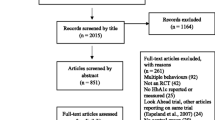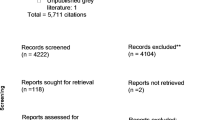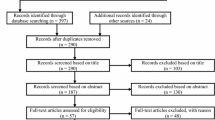Abstract
BACKGROUND
Social support is associated with better diabetes self-management behavior (SMB), yet interventions to increase family and friend support (FF support) have had inconsistent effects on SMB.
OBJECTIVE
To test whether FF support differentially affects specific SMBs and compare the influence of support from health professionals and psychological factors on specific SMBs to that of FF support.
DESIGN
Cross-sectional survey of people with diabetes recruited for a self-management intervention
PARTICIPANTS AND SETTING
One hundred sixty-four African-American and Latino adults with diabetes living in inner-city Detroit
MEASUREMENTS AND MAIN RESULTS
For every unit increase in FF support for glucose monitoring, the adjusted odds ratio (AOR) of completing testing as recommended was 1.77 (95% CI 1.21–2.58). FF support was not associated with four other SMBs (taking medicines, following a meal plan, physical activity, checking feet). Support from non-physician health professionals was associated with checking feet [AOR 1.72 (1.07–2.78)] and meal plan adherence [AOR = 1.61 (1.11–2.34)]. Diabetes self-efficacy was associated with testing sugar, meal plan adherence, and checking feet. Additional analyses suggested that self-efficacy was mediating the effect of FF support on diet and checking feet, but not the FF support effect on glucose monitoring.
CONCLUSIONS
The association between FF support and SMB performance was stronger for glucose monitoring than for other SMBs. Professional support and diabetes self-efficacy were each independently associated with performance of different SMBs. SMB interventions may need to differentially emphasize FF support, self-efficacy, or professional support depending on the SMB targeted for improvement.
Similar content being viewed by others
References
Lloyd CE, Wing RR, et al. Psychosocial correlates of glycemic control: the Pittsburgh Epidemiology of Diabetes Complications (EDC) study. Diabetes Res Clin Pract. 1993;21(2–3):187–195.
Sherbourne CD, Hays RD, et al. Antecedents of adherence to medical recommendations: results from the Medical Outcomes Study. J Behav Med. 1992;15(5):447–68.
Tillotson LM, Smith MS. Locus of control, social support, and adherence to the diabetes regimen. Diabetes Educ. 1996;22(2):133–9.
Gallant MP. The influence of social support on chronic illness self-management: a review and directions for research. Health Educ Behav. 2003;30(2):170–95.
DiMatteo MR. Social support and patient adherence to medical treatment: a meta-analysis. Health Psychol. 2004;23(2):207–18.
Shenkel RJ, Rogers JP, et al. Importance of "significant others" in predicting cooperation with diabetic regimen. Int J Psychiatry Med. 1985;15(2):149–55.
Levy RL. Social support and compliance: a selective review and critique of treatment integrity and outcome measurement. Soc Sci Med. 1983;17(18):1329–38.
Schafer LC, McCaul KD, et al. Supportive and nonsupportive family behaviors: relationships to adherence and metabolic control in persons with type I diabetes. Diabetes Care. 1986;9(2):179–85.
Hogan BE, Linden W, et al. Social support interventions: do they work? Clin Psychol Rev. 2002;22(3):381–440.
van Dam HA, van der Horst FG, et al. Social support in diabetes: a systematic review of controlled intervention studies. Patient Educ Couns. 2005;59(1):1–12.
Cohen DA, McKenzie TL, et al. Contribution of public parks to physical activity. Am J Public Health. 2007;97(3):509–14.
Diez Roux AV, Evenson KR, et al. Availability of recreational resources and physical activity in adults. Am J Public Health. 2007;97(3):493–9.
Laraia BA, Siega-Riz AM, et al. Proximity of supermarkets is positively associated with diet quality index for pregnancy. Prev Med. 2004;39(5):869–75.
Horowitz CR, Colson KA, et al. Barriers to buying healthy foods for people with diabetes: evidence of environmental disparities. Am J Public Health. 2004;94(9):1549–54.
Shaw BA, Gallant MP, et al. Assessing sources of support for diabetes self-care in urban and rural underserved communities. J Commun Health. 2006;31(5):393–412.
Greene J, Yedidia MJ, et al. Provider behaviors contributing to patient self-management of chronic illness among underserved populations. Journal of Health Care for the Poor & Underserved. 2005;16(4):808–24.
Anderson ES, Wojcik JR, et al. Social-cognitive determinants of physical activity: the influence of social support, self-efficacy, outcome expectations, and self-regulation among participants in a church-based health promotion study. Health Psychol. 2006;25(4):510–20.
Cohen S. Psychosocial models of the role of social support in the etiology of physical disease. Health Psychol. 1988;7(3):269–97.
DiIorio C, Shafer PO, et al. Project EASE: a study to test a psychosocial model of epilepsy medication managment. Epilepsy Behav. 2004;5(6):926–36.
Ciechanowski PS, Katon WJ, et al. Depression and diabetes: impact of depressive symptoms on adherence, function, and costs. Arch Intern Med. 2000;160(21):3278–85.
Park H, Hong Y, et al. Individuals with type 2 diabetes and depressive symptoms exhibited lower adherence with self-care. J Clin Epidemiol. 2004;57(9):978–84.
Connell CM, Davis WK, et al. Impact of social support, social cognitive variables, and perceived threat on depression among adults with diabetes. Health Psychol. 1994;13(3):263–73.
Warren BJ. Depression, stressful life events, social support, and self-esteem in middle class African American women. Arch Psychiatr Nurs. 1997;11(3):107–17.
Sarkar U, Fisher L, et al. Is self-efficacy associated with diabetes self-management across race/ethnicity and health literacy? Diabetes Care. 2006;29(4):823–9.
Two Feathers J, Kieffer EC, et al. Racial and Ethnic Approaches to Community Health (REACH) Detroit partnership: improving diabetes-related outcomes among African American and Latino adults. Am J Public Health. 2005;95(9):1552–60.
Feathers JT, Kieffer EC, et al. The development, implementation, and process evaluation of the REACH Detroit Partnership’s Diabetes Lifestyle Intervention. Diabetes Educ. 2007;33(3):509–20.
Kieffer EC, Willis SK, et al. Reducing disparities in diabetes among African-American and Latino residents of Detroit: the essential role of community planning focus groups. Ethn Dis. 2004;14(3 Suppl 1):S27–37.
Behavioral Risk Factor Surveillance System Survey Questionnaire. In. U.S. Department of Health and Human Services: Centers for Disease Control and Prevention (CDC); 2004.
Fitzgerald J, Davis W, et al. Development and validation of the diabetes care profile. Evaluation and the Health Professions. 1996;19(2):209–231.
Fitzgerald J, Anderson R, et al. The reliability of the diabetes care profile for African Americans. Evaluation and the Health Professions. 1998;21(1):52–65.
Toobert DJ, Hampson SE, et al. The summary of diabetes self-care activities measure. Diabetes Care. 2000;23(7):943–50.
Toobert DJ, Glasgow RE. Assessing diabetes self-management: the summary of diabetes self-care activities questionnaire. In: Clare B, ed. Handbook of psychology and diabetes. Amsterdam: Harwood Academic Publishers; 1994:351–375.
Behavioral Risk Factor Surveillance System Survey Questionnaire. In. U.S. Department of Health and Human Services: Centers for Disease Control and Prevention (CDC); 2003.
Williams GC, Freedman ZR, et al. Supporting Autonomy to Motivate Patients with Diabetes for Glucose Control. Diabetes Care. 1998;21(10):1644–1651.
Kroenke K, Spitzer R, et al. The PHQ-9: validity of a brief depression severity measure. J Gen Intern Med. 2001;16(9):606–13.
Long J. Regression models for categorical and limited dependent variables. Sage Publications; 1997.
Baron R, Kenny D. The moderator-mediator variable distinction in social psychological research: conceptual, strategic, and statistical considerations. J Pers Soc Psychol. 1986;51(6):1173–82.
StataCorp. Stata Statistical Software: Release 9. In. College Station, TX: StataCorp LP; 2005.
Bailey BJ, Lherisson-Cedeno D. Diabetes outcomes and practices: comparison of African Americans and Caucasians. J Natl Black Nurses Assoc. 1997;9(1):66–75.
Karter AJ, Ferrara A, et al. Self-monitoring of blood glucose: language and financial barriers in a managed care population with diabetes. Diabetes Care. 2000;23(4):477–83.
Kirk JK, Graves DE, et al. Racial and ethnic disparities in self-monitoring of blood glucose among US adults: a qualitative review. Ethn Dis. 2007;17(1):135–42.
Oster NV, Welch V, et al. Differences in self-management behaviors and use of preventive services among diabetes management enrollees by race and ethnicity. Dis Manage. 2006;9(3):167–75.
Thackeray R, Merrill RM, et al. Disparities in diabetes management practice between racial and ethnic groups in the United States. Diabetes Educ. 2004;30(4):665–75.
de Groot M, Welch G, et al. Cultural orientation and diabetes self-care in low-income African Americans with type 2 diabetes mellitus. Ethn Dis. 2003;13(1):6–14.
Fisher L, Chesla CA, et al. The family and disease management in Hispanic and European-American patients with type 2 diabetes. Diabetes Care. 2000;23(3):267–72.
Chesla CA, Fisher L, et al. Family predictors of disease management over one year in Latino and European American patients with type 2 diabetes. Fam Proc. 2003;42(3):375–90.
Fitzgerald JT, Anderson RM, et al. Differences in the impact of dietary restrictions on African Americans and Caucasians with NIDDM. Diabetes Educ. 1997;23(1):41–7.
Chlebowy DO, Garvin BJ. Social support, self-efficacy, and outcome expectations: impact on self-care behaviors and glycemic control in Caucasian and African American adults with type 2 diabetes. Diabetes Educ. 2006;32(5):777–86.
Ford ME, Tilley BC, et al. Social support among African-American adults with diabetes, Part 2: A review. J Natl Med Assoc. 1998;90(7):425–32.
McDonald PE, Wykle ML, et al. Predictors of social support, acceptance, health-promoting behaviors, and glycemic control in African-Americans with type 2 diabetes. J Natl Black Nurses Assoc. 2002;13(1):23–30.
Carranza SN, LeBaron S. Adherence among Mexican Americans with type 2 diabetes: behavioral attribution, social support, and poverty. Fam Med. 2004;36(8):539–40.
Gleeson-Kreig J, Bernal H, et al. The role of social support in the self-management of diabetes mellitus among a Hispanic population. Public Health Nurs. 2002;19(3):215–22.
Wen LK, Shepherd MD, et al. Family support, diet, and exercise among older Mexican Americans with type 2 diabetes. Diabetes Educ. 2004;30(6):980–93.
Heisler M, Vijan S, et al. When do patients and their physicians agree on diabetes treatment goals and strategies, and what difference does it make? J Gen Intern Med. 2003;18(11):893–902.
Zenk SN, Schulz AJ, et al. Fruit and vegetable intake in African Americans income and store characteristics. Am J Prev Med. 2005;29(1):1–9.
Johnson SB. Methodological issues in diabetes research. Measuring adherence. Diabetes Care. 1992;15(11):1658–67.
Vermeire E, Hearnshaw H, et al. Patient adherence to treatment: three decades of research. A comprehensive review. J Clin Pharm Ther. 2001;26(5):331–42.
Stewart M. The validity of an interview to assess a patient’s drug taking. Am J Prev Med. 1987;3(2):95–100.
Acknowledgements
Contributors
We thank the CHASS/REACH Detroit Partnership staff, the REACH Detroit Partnership Steering Committee (www.reachdetroit.org), and the REACH Detroit Partnership intervention participants for their involvement in this study. The REACH Detroit Partnership is affiliated with the Detroit Community-Academic Urban Research Center (www.sph.umich.edu/URC/).
Funding
Support for this study was provided by the Centers for Disease Control and Prevention Cooperative Agreement no. U50/CCU417409, the Michigan Diabetes Research and Training Center (NIDDK P60DK-20572). Michele Heisler is a VA HSR&D Career Development awardee. Ann-Marie Rosland is a Robert Wood Johnson Clinical Scholar.
Presentations
Results from this paper were presented at the Society of General Internal Medicine Midwest Region Annual Meeting on 29 September 2007.
Conflict of Interest
None disclosed.
Author information
Authors and Affiliations
Corresponding author
Appendix
Appendix
Survey questions | |
|---|---|
Sociodemographics | |
Gender/sex | Male or female |
Age | Calculated from date of birth (DOB) |
Race/ethnicity | -White |
What is the ethnic origin/race that you identify most with? Check only one | -Black |
-Hispanic/Latino | |
-Native American | |
-Asian or Pacific Islander | |
-Arabic | |
-Other (please specify) | |
Education: | -Less than high school |
What is the highest level of education you completed? Check only one answer | -High school graduate |
-Technical school | |
-Some college | |
-Two-year college (Associate’s degree) | |
-Four-year college (Bachelor’s degree) | |
-Graduate school (Master’s or Doctorate) | |
-Other | |
Health status | |
Functional status: | Yes or no |
Are you limited in any way in any activities because of physical, mental, or emotional problems? | |
Diabetes medication regimen: | Yes or no |
 - Are you taking diabetes pills? | |
 - Are you taking insulin? | |
Self-management behavior (SMB): | |
Days per week | |
On how many of the last 7Â days did you: | |
 - Take your recommended insulin dose or number of diabetes pills? | |
 - Follow a healthful eating plan? | |
 - Test your blood sugar at least as often as your doctor has recommended? | |
 - Check your feet? | |
Physical Activity: Behavioral Risk Factor Surveillance Survey (BRFSS) | Whether meet CDC physical activity guidelines: moderate activity × 30 min at least 5 days/week OR vigorous activity × 20 min at least 3 days/week |
Psychological factors | |
Diabetes self-efficacy: Perceived Competence for Diabetes Scale34: | Five-point agree-disagree |
Total scaled to 0–10 | |
 - You feel confident in your ability to manage your diabetes | Higher score = higher self-efficacy |
 - You feel capable of handling your diabetes now | |
 - You are able to do your own routine diabetes care now | |
 - You are able to meet the challenge of controlling your diabetes | |
Depressive symptoms: Patient Health Questionnaire (PHQ-9)35: | 0–27 |
Higher score = more depression symptoms | |
How often have you been bothered by each of the following symptoms during the past 2 weeks? | |
 - Feeling down, depressed, or hopeless? | |
 - Little interest or pleasure in doing things? | |
 - Trouble falling or staying asleep, or sleeping too much? | |
 - Feeling tired or having little energy? | |
 - Poor appetite or overeating? | |
 - Feeling bad about yourself - or that you are a failure or have let yourself or your family down? | |
 - Trouble concentrating on things, such as reading the newspaper or watching television? | |
 - Moving or speaking so slowly that other people noticed? Or the opposite – being so fidgety or restless that you moved around a lot more than usual? | |
 - Thoughts that you would be better off dead or of hurting yourself in some way? | |
Rights and permissions
About this article
Cite this article
Rosland, AM., Kieffer, E., Israel, B. et al. When Is Social Support Important? The Association of Family Support and Professional Support with Specific Diabetes Self-management Behaviors. J GEN INTERN MED 23, 1992–1999 (2008). https://doi.org/10.1007/s11606-008-0814-7
Received:
Revised:
Accepted:
Published:
Issue Date:
DOI: https://doi.org/10.1007/s11606-008-0814-7




